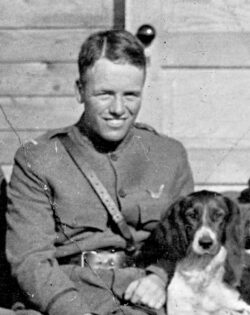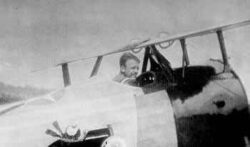Naming a Great Hearts School: Roosevelt
Great Hearts Roosevelt February 20, 2023 -
That the newest addition to our expanding network of schools bears the well-known namesake Roosevelt may be nothing to write home about. After all, there are streets and bridges, ships and bodies of water, institutions and buildings, and entire towns and cities that proudly bear the name of Roosevelt. Between Theodore and his distant cousin, Franklin Delano, one can imagine many reasons we would be compelled to name an institution of learning after these men of renown; men who are of such great consequence and achievement. However, it is not for these men that we name this academy, and it is not achievement or notoriety that we aim to esteem in the naming of this institution. Rather, it is for someone who is relatively unknown in the eyes of the public. Someone whose name I only just discovered when the academy “Great Hearts Roosevelt” was finally christened. That man’s name was Quentin Roosevelt. And naming a school after Quentin Roosevelt is something worth writing home about.
 Second Lieutenant Quentin Roosevelt was the youngest son of President Theodore Roosevelt and First Lady Edith Roosevelt. The glory years of his childhood were spent in the White House where, as leader of the “White House Gang,” he and his pals spent their days playing together and pulling pranks on its esteemed residents. As a child, he had all the vigor of his father and all the rambunctiousness of Tom Sawyer. An intelligent young man with magnetic energy, his upbringing and hard work led him to attend Harvard in 1915. He won the heart of Flora Whitney, great-granddaughter of Cornelius Vanderbilt, heiress to one of the world’s greatest fortunes. And in 1917 – the heart of the Great War – Quentin dropped out of college, kissed his new fiancé farewell, and joined the 1st Reserve Aero Squadron, the first air reserve unit in the nation.
Second Lieutenant Quentin Roosevelt was the youngest son of President Theodore Roosevelt and First Lady Edith Roosevelt. The glory years of his childhood were spent in the White House where, as leader of the “White House Gang,” he and his pals spent their days playing together and pulling pranks on its esteemed residents. As a child, he had all the vigor of his father and all the rambunctiousness of Tom Sawyer. An intelligent young man with magnetic energy, his upbringing and hard work led him to attend Harvard in 1915. He won the heart of Flora Whitney, great-granddaughter of Cornelius Vanderbilt, heiress to one of the world’s greatest fortunes. And in 1917 – the heart of the Great War – Quentin dropped out of college, kissed his new fiancé farewell, and joined the 1st Reserve Aero Squadron, the first air reserve unit in the nation.
He brought the same level of vitality to his military life as he did his civilian life. His eyesight was so poor that he could not qualify to be a pilot. This did not stop Quentin. He committed the charts to memory and passed his exam with flying colors. He snuck in extra hours of flight off the record, pushed his plane and his body to its limits, and had a courage that often bordered on recklessness. He won the friendship and admiration of his fellow airmen, and the respect of his commanding officer, Eddie Rickenbacker, the most successful ace in World War I and commander of the 94th Aero Squadron. Quentin eventually made it to the front lines, successfully evading and taking down enemy planes. One can imagine the rest of this biography – page after page filled with adventures, accomplishments, and accolades – the spitting image of his father. But turn the page, and there the story ends. On July 14, 1918, Quentin was shot and killed in aerial combat over enemy lines at the age of 20.
Quentin Roosevelt was born into a world of privilege few in history will ever know. Yet, he set it all aside, stripping himself of the wealth and protections his name and connections offered him, to serve, and to die, alongside his fellow Americans as an equal. Perhaps this is why he was given full battlefield honors by the Germans who found him, something not done for any other American soldier in World War I? Even enemy soldiers were able to recognize that this man and his actions deserved deference. That the son of a President put himself in the line of fire was an act worthy of their highest honor. What the Germans esteemed that day was a life of sacrifice. It is something praised across time and across cultures. It is an emptying of oneself for the love of something greater than the self. Sacrifice is the highest of human ideals. Sacrifice is love in action.
 We at Great Hearts aim to form students who are willing to lead lives of loving sacrifice. Who, given the choice, would gladly lay down their lives for another man. Though no teacher or parent would ever wish a circumstance requiring this level of sacrifice upon any of our precious children, every teacher and parent’s hope is to develop in their children a heart this is willing to give itself fully to something transcendental. To put their loved ones – and even a stranger – above the love of self.
We at Great Hearts aim to form students who are willing to lead lives of loving sacrifice. Who, given the choice, would gladly lay down their lives for another man. Though no teacher or parent would ever wish a circumstance requiring this level of sacrifice upon any of our precious children, every teacher and parent’s hope is to develop in their children a heart this is willing to give itself fully to something transcendental. To put their loved ones – and even a stranger – above the love of self.
This is at the very core of the mission of our schools at Great Hearts – to cultivate the hearts and minds of students in the pursuit of Truth, Goodness, and Beauty. It is about nourishing a heart that is committed to the most noble and praiseworthy of things. To develop a heart that esteems Truth above opinion, Beauty above vanity, and Goodness, above convenience. Every day, we seek to put the most beautiful, good, and noble of things in front of our students in the hope that they learn that the world is so much more beautiful, good, and noble then they realize. Every aspect of our program, from the classic literature we choose, to the history in which we immerse ourselves, to the habits we seek to instill, and most importantly, to the teachers we daily put in front of our students, are carefully chosen to elevate the virtues that are worth elevating and praise the things that are worthy of our praise.
 These things are needed in education now more than ever. We are daily immersed in a culture that cultivates a heart of self-gratification, quick fixes, and entitlement, rather than a heart of gratitude, perseverance, and sacrifice. Too often, the entertainment we consume and the technology we use turns us inward, rather than expanding our vision to see that we owe those around us the full use of our abilities and our talents. Our hope is to provide a sanctuary that allows our students to immerse themselves in a different culture. A culture that elevates the True, the Good, and the Beautiful. Our hope is that our students learn that we live on the shoulders of men and women who have lived lives of sacrifice, passed on from generation to generation, and that we have a duty to build upon this work. This is what a classical education is all about.
These things are needed in education now more than ever. We are daily immersed in a culture that cultivates a heart of self-gratification, quick fixes, and entitlement, rather than a heart of gratitude, perseverance, and sacrifice. Too often, the entertainment we consume and the technology we use turns us inward, rather than expanding our vision to see that we owe those around us the full use of our abilities and our talents. Our hope is to provide a sanctuary that allows our students to immerse themselves in a different culture. A culture that elevates the True, the Good, and the Beautiful. Our hope is that our students learn that we live on the shoulders of men and women who have lived lives of sacrifice, passed on from generation to generation, and that we have a duty to build upon this work. This is what a classical education is all about.
In his own right, Quentin Roosevelt is a man worthy of honor and esteem. Yet, in the end, the naming of this school transcends Quentin. How many men and women have laid down their lives in love, on or off the battlefield, whose names have never been etched onto a building or drawn on a map? How many, though never asked to give up their physical lives, have lived out lives of daily sacrifice? Who have served and toiled and strived every day to impact their fellow man in immeasurable ways, but who have lived and died in obscurity? Who, when two roads diverged, they took the road of humility, and not that of glory? How many never sought a path that led to renown and recognition, but who in their meekness of spirit lived a life of loving sacrifice? These lives of sacrifice are rarely immortalized. In Quentin, we are able to elevate not only his life, but the life of every single one of those who will never have a school named after them. This school is for them, and at Great Hearts Roosevelt, our hope is to add generations more of these men and women to the ledger.
 This article was written by Stephen Philabaum. Mr. Philabaum is the Headmaster of the Archway Program (K-5) at Great Hearts Roosevelt.
This article was written by Stephen Philabaum. Mr. Philabaum is the Headmaster of the Archway Program (K-5) at Great Hearts Roosevelt.
Do you have a story or know of a story that you would like to see featured at Great Hearts? Please contact jmoore@greatheartsamerica.org.